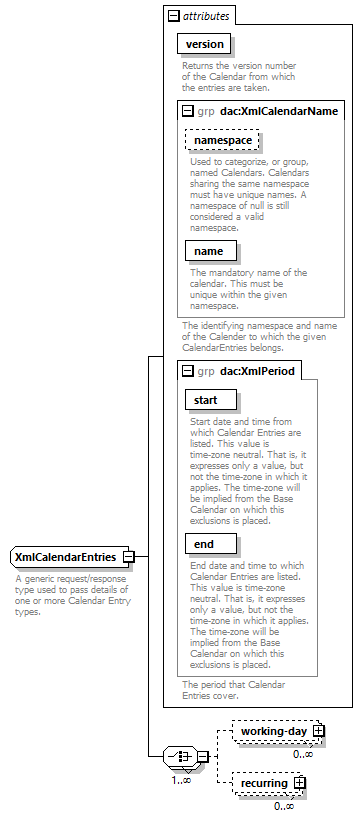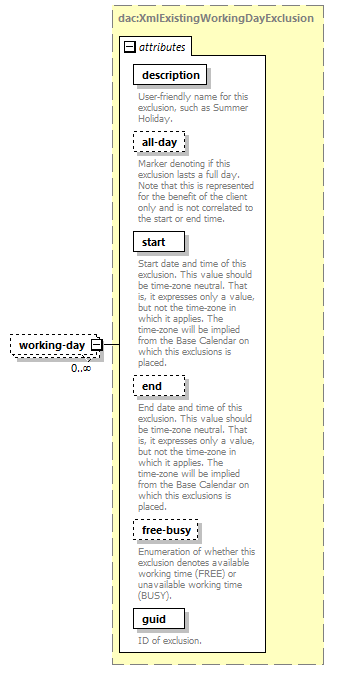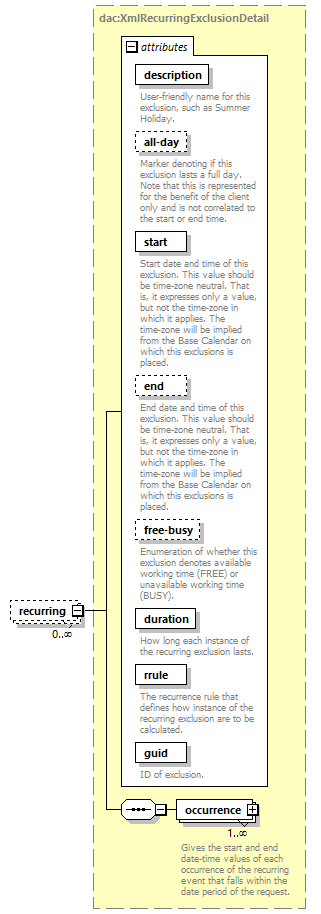| diagram |  |
||||||||||||||||||||||||||||||||||||||||||||||
| namespace | http://workcal.api.dac.n2.tibco.com | ||||||||||||||||||||||||||||||||||||||||||||||
| children | working-day recurring | ||||||||||||||||||||||||||||||||||||||||||||||
| used by |
|
||||||||||||||||||||||||||||||||||||||||||||||
| attributes |
|
||||||||||||||||||||||||||||||||||||||||||||||
| annotation |
|
||||||||||||||||||||||||||||||||||||||||||||||
| source | <xs:complexType name="XmlCalendarEntries"> <xs:annotation> <xs:documentation>A generic request/response type used to pass details of one or more Calendar Entry types.</xs:documentation> </xs:annotation> <xs:choice minOccurs="1" maxOccurs="unbounded"> <xs:element name="working-day" type="dac:XmlExistingWorkingDayExclusion" minOccurs="0" maxOccurs="unbounded"/> <xs:element name="recurring" type="dac:XmlRecurringExclusionDetail" minOccurs="0" maxOccurs="unbounded"/> </xs:choice> <xs:attribute name="version" type="dac:XmlLockVersion" use="required"> <xs:annotation> <xs:documentation>Returns the version number of the Calendar from which the entries are taken.</xs:documentation> </xs:annotation> </xs:attribute> <xs:attributeGroup ref="dac:XmlCalendarName"> <xs:annotation> <xs:documentation>The identifying namespace and name of the Calender to which the given CalendarEntries belongs.</xs:documentation> </xs:annotation> </xs:attributeGroup> <xs:attributeGroup ref="dac:XmlPeriod"> <xs:annotation> <xs:documentation>The period that Calendar Entries cover.</xs:documentation> </xs:annotation> </xs:attributeGroup> </xs:complexType> |
attribute XmlCalendarEntries/@version
| type | XmlLockVersion | ||
| properties |
|
||
| annotation |
|
||
| source | <xs:attribute name="version" type="dac:XmlLockVersion" use="required"> <xs:annotation> <xs:documentation>Returns the version number of the Calendar from which the entries are taken.</xs:documentation> </xs:annotation> </xs:attribute> |
element XmlCalendarEntries/working-day
| diagram |  |
||||||||||||||||||||||||||||||||||||||||||||||||||||||
| type | XmlExistingWorkingDayExclusion | ||||||||||||||||||||||||||||||||||||||||||||||||||||||
| properties |
|
||||||||||||||||||||||||||||||||||||||||||||||||||||||
| attributes |
|
||||||||||||||||||||||||||||||||||||||||||||||||||||||
| source | <xs:element name="working-day" type="dac:XmlExistingWorkingDayExclusion" minOccurs="0" maxOccurs="unbounded"/> |
element XmlCalendarEntries/recurring
| diagram |  |
||||||||||||||||||||||||||||||||||||||||||||||||||||||||||||||||||||||
| type | XmlRecurringExclusionDetail | ||||||||||||||||||||||||||||||||||||||||||||||||||||||||||||||||||||||
| properties |
|
||||||||||||||||||||||||||||||||||||||||||||||||||||||||||||||||||||||
| children | occurrence | ||||||||||||||||||||||||||||||||||||||||||||||||||||||||||||||||||||||
| attributes |
|
||||||||||||||||||||||||||||||||||||||||||||||||||||||||||||||||||||||
| source | <xs:element name="recurring" type="dac:XmlRecurringExclusionDetail" minOccurs="0" maxOccurs="unbounded"/> |
XML Schema documentation generated by XMLSpy Schema Editor http://www.altova.com/xmlspy